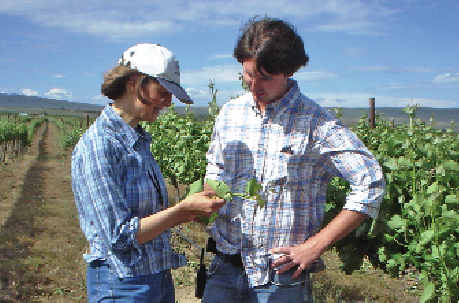
Astrid Goplen explains the sustainable Vinewise program
to Derek Hill of Oasis Farms in Prosser, Washington. Goplen, funded by a state grant, is working to increase awareness and grower participation in the self-assessment component of Vinewise.
Are you Vinewise? If you’re a Washington State wine grape grower and haven’t completed the on-line, self-assessment tool to evaluate the sustainability of your vineyard, Astrid Goplen is here to help. Goplen, an integrated pest management consultant for tree fruit and grape growers, is working on behalf of the Washington Wine Industry Foundation to develop a benchmark of sustainable practices of the state wine industry.
Through a specialty crop block grant received from the Washington State Department of Agriculture, the Wine Foundation is offering growers the opportunity to have free, professional assistance to learn how to use the Vinewise guide and evaluate their practices.
Vinewise, created by and for Washington wine grape growers and vintners, is an interactive learning and self-assessment tool to help growers prioritize and focus on sustainability in everyday farming and business practices.
The program addresses sustainable practices related to 16 topics, from developing business plans, lending, and writing grower-winery contracts to site preparation, pest management, and being a good neighbor. Checklists are especially helpful to new growers considering involvement in Washington’s wine industry. The checklists are followed by self-evaluation forms that benchmark a grower’s progress towards implementing sustainable practices, and links to educational resources.
Educational tool
After completing the self-assessment component, growers can learn how their sustainable practices compare to industry averages. “Vinewise is a great product to use as an educational tool and get an outward picture of how you are doing,” said Goplen, who was a research technician at the Washington State University’s Tree Fruit Research and Extension Center in Wenatchee when she first moved from Denmark to the United States in 1993.
While at WSU, she worked on phytophagous mite control and co-authored several publications. For the last ten years, she has been an independent IPM consultant for tree fruit and grape growers in central Washington and Yakima Valley. She helped produce and distribute the IPM manual “Practical Guide to Codling Moth Control in Washington, 2005,” through a grant from the American Farmland Trust.
Her specific objectives for Vinewise are to increase overall awareness and have 150 producers complete the self-assessment form, with 10 percent developing an action plan. “My goal is to enhance overall awareness of Vinewise and completion of the self assessments by 25 percent, based on industry surveys done both pre and post my work,” she explained.
A presurvey, conducted last summer before her contract began, showed that about 65 percent of the survey respondents were aware of Vinewise, but only 12 percent had used the self-assessment tool. The survey was emailed to 300 growers, with 100 responding. Goplen has attended grower meetings hosted by wineries to explain Vinewise, besides working with growers one on one.
She’s found that most growers have an understanding of sustainability and are already implementing some sustainable practices. “The challenge is in getting Vinewise on the growers’ radar screens and documenting that level of sustainability—that’s what is usually missing,” she said, adding that Vinewise is full of “details.”
She believes that much of a grower’s improvement in sustainable practices will be in the details. Many growers fear that sustainable practices will cost more than conventional farming, but her experience with IPM has been that most IPM costs are comparable to traditional farming. “Once growers are doing sustainable things, I think the costs will actually go down.”
Certification
Goplen said that she has been surprised at the number of growers interested in certification by a third party. “I thought there would be more questions about why is the industry is focusing on sustainability, but there have been even more questions about ‘how do I get certified,’” she said.
To avoid duplicating certification efforts, the Washington wine industry partnered Vinewise with Oregon’s Low Input Viticulture and Enology (LIVE), a nonprofit organization that offers third-party certification through the International Organization for Biological Control. LIVE uses a scoring system of basic required practices, prohibited practices, and ecological options as part of its audit.
And, because LIVE has teamed up with Salmon Safe, an organization dedicated to restoring and maintaining healthy watersheds, becoming LIVE certified also means the grower or winery is certified as meeting Salmon Safe practices. “It’s a positive step to be able to tie Vinewise in with LIVE and be able to be certified at the same time by IOBC and Salmon Safe,” Goplen said.
But she noted that Vinewise takes a broader look at sustainable practices than LIVE because it involves evaluating practices that go beyond viticulture, such as lending, crop insurance, and more. Vinewise is a free, on-line guide. Goplen noted that certification programs, such as LIVE, involve a fee for the third-party audit.
Industry viability
Vinewise originally started as way to identify and manage risk for the wine industry and was funded through a risk management grant of the U.S. Department of Agriculture. “It was based on the question of what keeps growers and winery owners awake at night,” said Vicky Scharlau, executive director of the Washington Association of Wine Grape Growers. In the last decade, the industry has grown rapidly, with many new growers and winemakers entering the business.
“Ensuring viability—sustainability—of the industry was the birth of Vinewise,” she said. “Our focus for Vinewise was, above all else, about educating the industry,” Scharlau said. “Whether you are a brand new grower or winery or have been in the business for 30 years, you can gain something by going through Vinewise, the checklists, self assessment, and developing action plans.”
Vinewise was purposely created as an on-line tool—not contained in a book—so that it was fluid and easily updated and “evergreen,” she said. For more information on Vinewise, visit www.vine wise.org. Astrid Goplen can be reached by e-mail at astrid.goplen@verizon.net or by calling (509) 539-6331. •

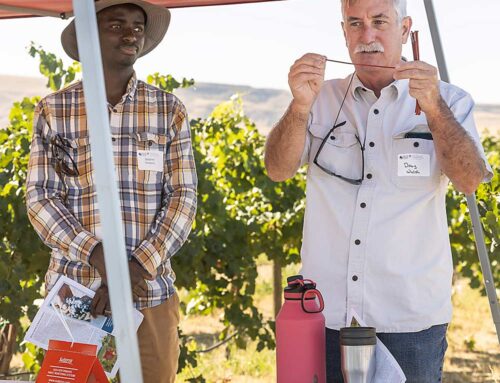
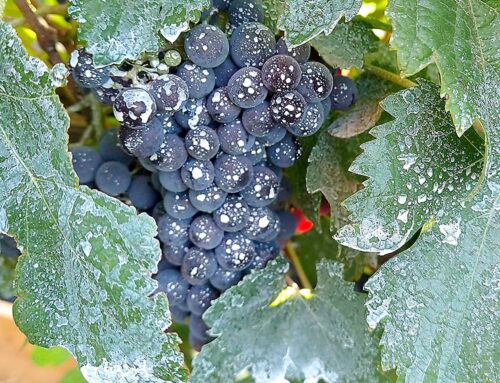
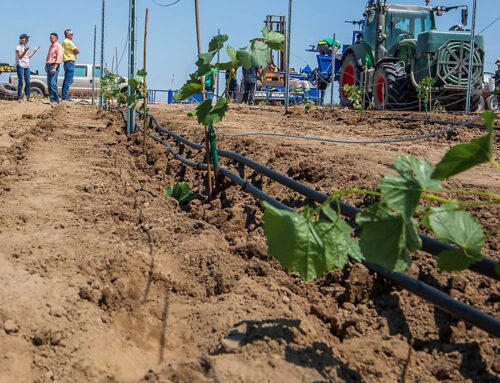
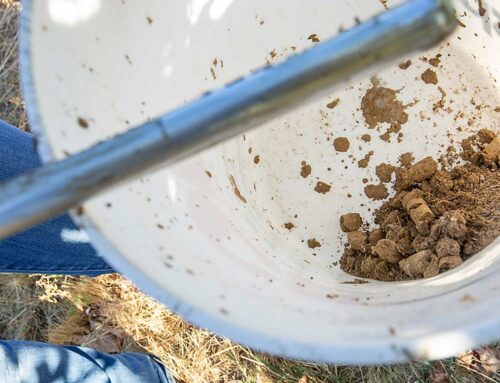
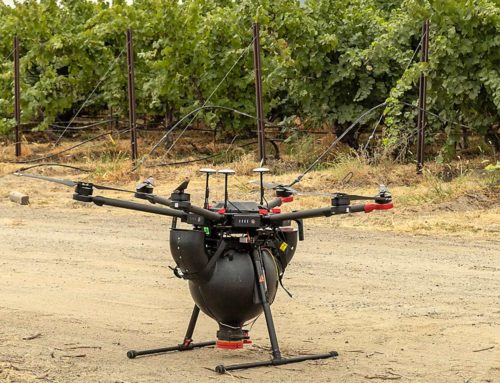
Leave A Comment